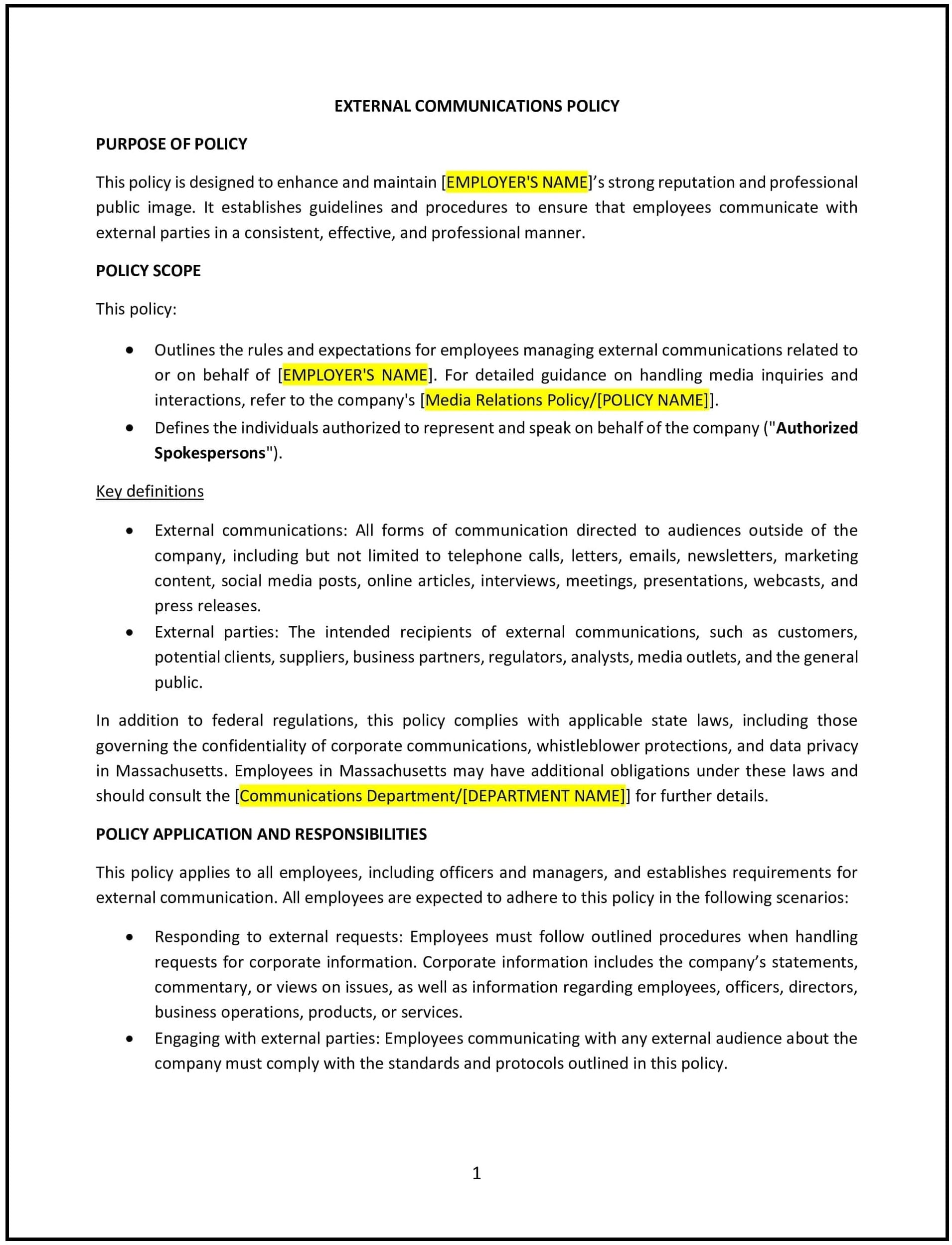External communications policy (Massachusetts): Free template
Got contracts to review? While you're here for policies, let Cobrief make contract review effortless—start your free review now.

Customize this template for free
This external communications policy is designed to help Massachusetts businesses establish guidelines for managing communications with external parties, such as customers, vendors, the media, government agencies, and the public. The policy outlines the company’s approach to maintaining consistency, professionalism, and confidentiality in external communications, ensuring that messages accurately reflect the company’s values, objectives, and legal obligations.
By adopting this policy, businesses can safeguard their reputation, reduce legal risks, and promote clear, effective communication with external stakeholders.
How to use this external communications policy (Massachusetts)
- Define external communication channels: Clearly outline the communication channels that are considered external, including social media, press releases, email correspondence, marketing materials, and public statements. The policy should specify which platforms are acceptable for communicating with external parties.
- Assign responsibilities for external communications: Designate specific employees or departments (such as public relations, marketing, or legal teams) who are responsible for managing external communications. The policy should specify who has the authority to issue official statements or communicate on behalf of the company.
- Set guidelines for consistent messaging: Ensure that all external communications align with the company’s brand, values, and key messages. The policy should provide guidance on tone, language, and content to maintain a consistent message across all external channels.
- Address sensitive and confidential information: Specify the types of sensitive or confidential information that should not be disclosed in external communications, such as trade secrets, internal strategies, or personal employee information. The policy should provide instructions on how to handle requests for confidential information.
- Provide protocols for media relations: Outline the procedures for interacting with the media, including how to respond to media inquiries, who is authorized to speak to the press, and how to handle interviews and public statements.
- Comply with Massachusetts and federal laws: Ensure that external communications comply with Massachusetts state laws, federal regulations, and industry-specific guidelines, including those related to advertising, intellectual property, and consumer protection.
- Review and update regularly: Periodically review and update the policy to reflect changes in the company’s communication strategy, legal requirements, or external factors (such as the rise of new communication technologies or platforms).
Benefits of using this external communications policy (Massachusetts)
This policy offers several benefits for Massachusetts businesses:
- Promotes clear, consistent messaging: By setting clear guidelines, businesses can ensure that all external communications reflect the company’s values and objectives, maintaining a consistent and professional brand image.
- Reduces legal risks: The policy helps prevent the accidental disclosure of confidential information and ensures that all external communications comply with Massachusetts state laws, federal regulations, and industry standards.
- Protects the company’s reputation: A well-managed external communications strategy can help protect the company’s reputation by ensuring that information shared with the public is accurate, timely, and aligned with the company’s objectives.
- Enhances relationships with external stakeholders: By managing communications with customers, vendors, and the media effectively, businesses can build trust and maintain strong relationships with key external stakeholders.
- Increases transparency: The policy encourages transparent communication with external parties, ensuring that stakeholders are informed about the company’s activities, products, and services in a consistent and responsible manner.
- Improves crisis management: In the event of a crisis, having a clear and structured communication plan in place helps businesses manage the situation effectively, reducing the risk of reputational damage or legal complications.
Tips for using this external communications policy (Massachusetts)
- Communicate the policy clearly: Ensure that all employees involved in external communications are aware of the policy and understand their roles and responsibilities. Provide training on the company’s communication strategy, brand guidelines, and legal requirements.
- Monitor external communications: Regularly monitor external communication channels (e.g., social media, press releases, and customer service interactions) to ensure that the company’s messaging is consistent and aligned with the policy.
- Provide a review process: Implement a review process for external communications, such as approval by senior management, legal teams, or PR departments, to ensure that content is accurate, compliant, and aligns with the company’s brand.
- Use technology to streamline communications: Consider using communication management tools to centralize and streamline external communications, making it easier to track messages, manage approvals, and ensure consistency.
- Handle sensitive issues with care: For sensitive or controversial topics, the policy should provide guidance on how to craft messages carefully, maintain transparency, and respond to external inquiries in a way that protects the company’s reputation.
- Review and update regularly: Regularly review and update the policy to keep it aligned with the company’s evolving communication needs, changes in the business environment, and new legal or regulatory requirements.